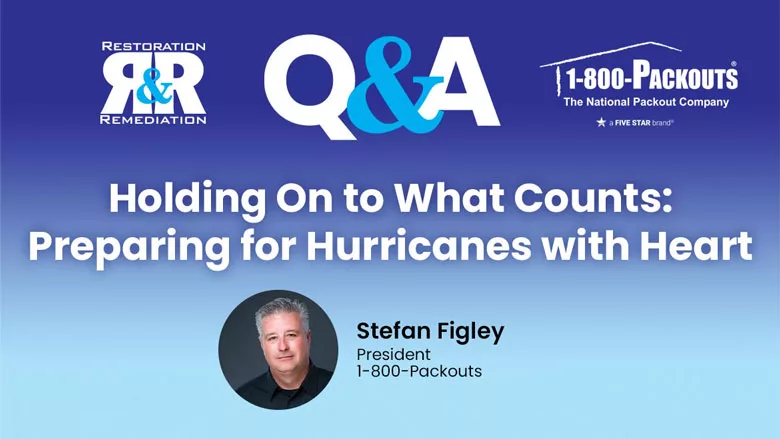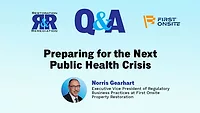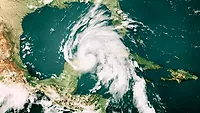Holding On to What Counts: Preparing for Hurricanes with Heart and Strategy
Protect your home and what makes it one with expert hurricane tips from Stefan Figley

Photo courtesy of 1-800-Packouts; image design by R&R art dept.
With hurricane season here, preparation becomes more than just a checklist; it becomes a lifeline. Stefan Figley, President of 1-800-Packouts and a seasoned expert in disaster recovery and restoration, shares his insights and hard-earned lessons from the last two hurricane seasons. In this Q&A, he addresses the emotional and practical realities of hurricane preparedness, offering guidance to help homeowners protect not just their property, but the memories and moments that make a house a home.
Q: What are some of the lessons you learned from the last two hurricane seasons?
A: Over the last two hurricane seasons, we’ve seen firsthand how critical it is for homeowners to have a solid plan in place before a storm ever makes landfall. It’s not just about the structure of your home—it’s about your memories, your keepsakes and the personal items that make your house a home. Imagine opening a drawer only to find your grandmother’s photos soaked, or pulling out a cherished quilt passed down for generations, now ruined. The emotional impact of these losses can be devastating. And it’s not just the areas directly hit by the eye of the storm that suffer—hurricanes like Helene and Milton showed us that the path of destruction can stretch far inland. Being prepared means understanding that even if you’re miles away, you can still be affected. That’s why it’s crucial to document your belongings, maintain updated insurance information and have trusted service providers identified ahead of time.
Q: Would you change your advice to your customers moving forward this year’s season?
A: The core advice remains the same – preparation is everything. But I would add this: think about what you’d miss most if it were damaged or lost. It’s easy to focus on boarding up windows, but what about the photo albums, the letters from loved ones or your child’s artwork? Proactive planning means not just having an emergency kit but also taking steps to protect the things that are irreplaceable. Identify trusted restoration partners now, so you’re not scrambling in a crisis.
Q: What was one thing you noticed as a common theme between Texas, Florida and the Carolinas?
A: Resilience. In every community, we saw people coming together, neighbors helping neighbors and businesses stepping up. But we also saw heartbreak—families who didn’t know where to begin when they returned home to damage. They stood in water-soaked living rooms, unsure of where to even start. That’s why preparation and community support go hand in hand. It’s about more than rebuilding—it’s about restoring a sense of normalcy.
Q: What are some of the most overlooked things you’ve noticed when preparing for a hurricane?
A: Documentation is so often overlooked. Preparing for a hurricane can feel overwhelming—it's hard to know where to start, and it can be frightening to think about what might happen. But having a plan in place isn’t just about being cautious—it’s about having peace of mind. When you know your most important belongings are protected, and your loved ones are safe, you’ve already done the most important part. It’s not just about the house; it’s about your life, your memories and the people you care about.
Another critical but often overlooked aspect is understanding your insurance policy. Too many homeowners only glance at their policy after a storm has hit—when it’s too late. Know what’s covered and what isn’t. Understand your deductibles, your coverage limits and who to contact if you need to make a claim. Keep a digital copy of your policy stored where you can easily access it, even if you can’t return home. In a crisis, clear information can be the difference between a smooth recovery and a devastating loss.
Q: How can consumers avoid scams or shady contractors in the aftermath of a storm?
A: The best protection is to work with established, reputable companies. Before a storm, take the time to research and identify trusted service providers, verifying their credentials and reputation. Unfortunately, hurricane-prone areas often see an influx of out-of-area contractors looking to capitalize on the increased demand. Be cautious of anyone pressuring you to sign a contract immediately or offering unrealistically low prices. Building relationships with reputable service providers before a storm means you won’t have to make a rushed decision when you’re most vulnerable.
Q: What advice do you have for people who recently moved to a hurricane-prone area and have never experienced one before?
A: It’s easy to underestimate a storm until you’ve been through one. Don’t just think of it as a weather event—think of it as a life event. Educate yourself and plan ahead. Learn the evacuation routes for your area and understand the difference between voluntary and mandatory evacuations. Identify local shelters, know the safest routes to reach them and keep a list of emergency contacts. Make sure you understand your home’s flood risk and the types of storms your area is most likely to experience. Secure what matters most, and plan for both your safety and the preservation of your memories. Talk to your neighbors who have experienced storms before—they’re often the best source of practical advice.
Q: How can people prepare their homes to minimize damage?
A: A: Start with the basics – secure outdoor items like patio furniture, grills and decorations that could become projectiles in high winds. Trim overhanging branches, clean gutters and make sure your downspouts direct water away from your home. Reinforce windows and doors with storm shutters or plywood and ensure your roof is in good condition, fixing any loose shingles. Inside, look around—what would you miss most if it were damaged? Take clear photos, create an inventory of your valuables and store this list in the cloud. But even with all the preparation, it's normal to feel anxious or scared when a hurricane is approaching. You might wonder if you've done enough or worry about what could happen. That's okay—those feelings are natural. Remember that preparation is about more than just protecting your home’s walls and roof. It’s about giving yourself the best chance to protect what truly matters—the memories, keepsakes and moments that make your house a home. And even if the worst happens, knowing you’ve done everything you can will give you strength to face whatever comes next.
Looking for a reprint of this article?
From high-res PDFs to custom plaques, order your copy today!







